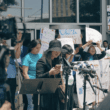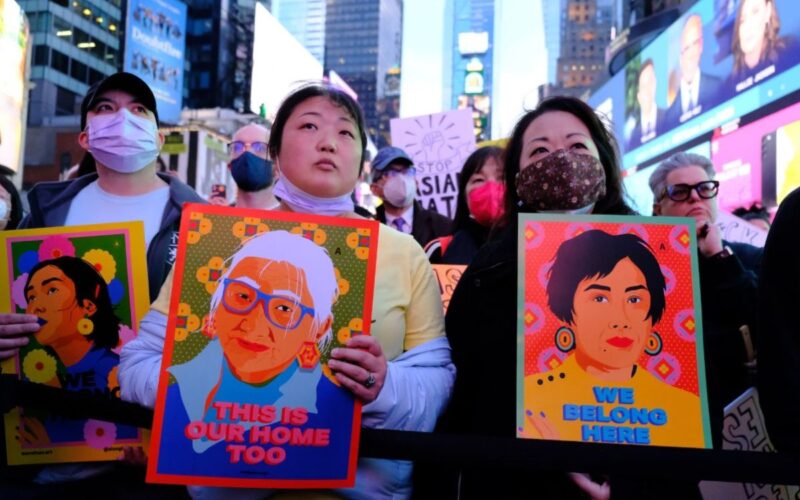Sign up here to receive The Yappie's weekly briefing on Asian American + Pacific Islander politics and support our work by making a donation.
Last Thursday marked the two-year anniversary of the Atlanta spa shootings that killed eight people, including six Asian women, after a white gunman opened fire at three Asian-owned establishments. As the world slowly re-opens, advocates are escalating calls on officials to strengthen holistic responses to anti-Asian violence.
The 23-year-old man charged with carrying out the shootings was sentenced to four consecutive life sentences plus 35 years after pleading guilty to killing four people and wounding a fifth in Cherokee County.
- He will face a death penalty trial for the murders in Fulton County, but proceedings likely won’t kick off until May, the Atlanta Journal-Constitution’sShaddi Abusaidreports. Fulton prosecutors are also pursuing hate crime enhancements under a state law enacted after Ahmaud Arbery’s murder.
- Robert Peterson, whose mother Yong Ae Yue died in the shootings, told Axios’ Shawna Chen in October that his family backs the Fulton prosecutors’ push for the death penalty and enhancements. “The fact that we’re fighting for it to be recognized as a hate crime is important to me,” he said.
- About 70% of Georgia’s Asian population is concentrated in Atlanta. The shootings sparked an outcry both locally and across the nation as people rallied to protest in dozens of cities. It also turned into a moment of reckoning with “the violence, racism and misogyny intertwined with the historical fetishization of Asian women,” The Yappie’s Shawna Chen wrote at the time.


The COVID-19 Hate Crimes Act was signed into law in 2021 in response to the shooting and spikes in anti-Asian hate crimes. The legislation, sponsored by Asian American lawmakers, aimed to provide more tools and resources for government and law enforcement to better prevent, track, and respond to hate incidents.
- The Department of Justice in 2021 awarded more than $21 million to community organizations and state, local, and tribal agencies for the purpose of addressing hate crimes. Attorney General Merrick Garland later hired a language access coordinator and directed federal agencies to review their practices and policies so as to better reach people with limited English proficiency.
- Rep. Grace Meng (D-New York) introduced the Teaching Asian Pacific American History Act in 2021 to mandate that K-12 schools teach AAPI history in order to work toward dismantling discrimination and prejudice against the AAPI community. Several states have since implemented their own requirements for Asian American history in public school curricula.
- Under President Joe Biden, the DOJ’s Civil Rights Division has taken steps to bolster training and support for state and local efforts aimed at preventing pandemic-related harassment and discrimination.
- Several states set aside additional funding to tackle anti-Asian hate—most notably California, which in 2021 greenlit a $156 million budget for AAPI-focused initiatives such as victim support and crime prevention services.
And yet—it’s still far from enough. Roughly a third of Asian Americans say they have changed their daily routine out of concern about the threat of violence, a 2022 Pew Research Center survey found. About 40% of the Asian Americans surveyed also said their local elected officials were doing a “very or somewhat bad job” of preventing anti-Asian violence.


- More recent tragedies—including the racially motivated stabbing of an Asian American college student in Indiana and mass shootings in Monterey Park and Half Moon Bay—also shook the Asian American community nationwide. Though the two suspects in the shootings were Asian men, it heightened Asian Americans’ existing anxieties about stepping foot outside their homes.
- “Less than a month ago, another family is experiencing what my family had to go through,” Peterson told ABC News’ Nakylah Carter. “We say we don’t want other families to experience this. But again and again, we see exactly that. And we see our leadership … lacking in progression.”
MOVING FORWARD: The Asian Justice Movement partnered with other Asian American community organizations to host an event on March 16—titled “Always With Us: Asian Americans Rise Against Hate”—in five cities including Atlanta to commemorate the anniversary and demand stronger action in addressing anti-Asian hate locally and nationwide.
- The Asian Leaders Alliance and the Asian Justice Movement created a resource guide in 2023 for best practices in supporting businesses and employees and to facilitate community advocacy across various organizations supporting AAPIs.
- “These things are still happening and it is creating a sense of fear and a lack of safety in our community,” Eugena Oh, The Asian American Foundation’s NYC regional director, said to ABC News’ Nakylah Carter.
- Advocates point to the need to fight systemic racism and bolster education about the wide spectrum of anti-Asian violence.
- “It’s not just physical assaults on the street, but it’s our communities being targeted for detention and deportation,” Phi Nguyen, executive director of Asian Americans Advancing Justice-Atlanta, said to Axios’ Kristal Dixon on the one-year anniversary of the shootings last year. “It’s also our communities having their votes suppressed. It’s the … white supremacy that our communities face.”
This story appeared as "The Big Story" in The Yappie's March 21, 2023 newsletter.
The Yappie is your must-read briefing on AAPI power, politics, and influence, fiscally sponsored by the Asian American Journalists Association. Make a donation, subscribe, and follow us on Twitter (@theyappie). Send tips and feedback to [email protected].









